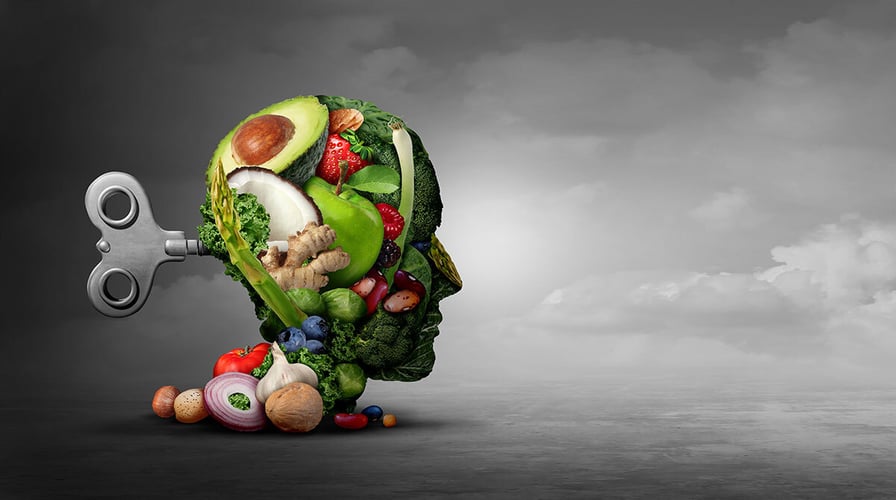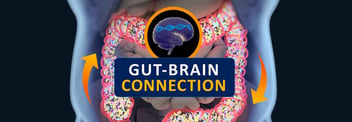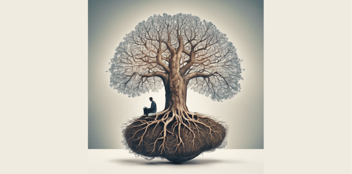Food Moods: Getting to the “roots” of your mental health with nutritional psychiatry
- Home
- Blog

Where do you seek emotional comfort at times of inner turmoil and stress? For me, beginning in a traumatic childhood and continuing to the present day, I find the company of nature to be one of the greatest sources of solace. And as we look at the core concepts of Root Cause Psychiatry, we also see that nature provides even more “fuel” to ease our emotional comfort thanks to emerging science that shows that a plant based diet offers a nutritional approach to improving mental health through one’s psychiatric treatments.
Part of the connection we feel with nature can undoubtedly be attributed to the symbiotic relationship we share. As most of us remember from our elementary school days, we humans rely on plants and trees for oxygen, and in turn, they rely on us for carbon dioxide. Similarly, our kinship must also be attributed to the incredible similarities between our lives and theirs. In our last blog on our bodies’ Methylation Time Machine, we discussed how methylation of our genes is essential for life, and how proper methylation can prevent premature aging of brain cells associated with chronic mental illness. But we aren’t the only ones who rely on methylation. Wondrously, gene methylation is also essential for photosynthesis, the process by which plants and trees produce the oxygen we breathe and the carbohydrates we eat. In turn we use that oxygen and carbohydrate to support our metabolism and cellular energy production which powers life itself, and produces the carbon dioxide released by our breathing to be recycled back to plants and trees to begin the cycle anew.
But what about the feeling of kinship that exists beyond basic biology—what if that feeling is rooted not just in the appreciation that nature keeps us alive, but that a plant based diet regulates the very genes that help our minds and our bodies thrive, and enables our cells to remain youthful?
“For what it’s worth: it’s never too late or, in my case, too early to be whoever you want to be. There’s no time limit, stop whenever you want. You can change or stay the same, there are no rules to this thing. We can make the best or the worst of it… I hope you live a life you’re proud of. If you find that you’re not, I hope you have the courage to start all over again.”
― David A. Sinclair, Ph.D.
Lifespan: Why We Age—and Why We Don't Have To
The “Roots” of Mental Health
To dig deeper, let us consider the way that nature appears in our human language that serves to underscore our innate connection to trees and plants. We speak fondly of our “family trees”, which help us trace our lineage, and of “putting down roots” as we create a home and a family for ourselves. The theme of this blog series is to discern the “root causes” of mental health!
But are these examples really just metaphors—or do they suggest something more significant? Thanks to cutting-edge science, this question is not merely theoretical.
We now understand that “trees” of relationships—including the genetics found in our own family trees—are now part of the first line of defense in combating diseases. For example, when a new virus strain is detected (think coronavirus), one of the first steps performed by researchers is to sequence the DNA of that strain and then gene sequences from that strain are compared to other known viruses from the same family. That information allows more rapid vaccine development.
If you’ve been following along with this blog series as we’ve explored the root causes of unremitting mental illness, you also know that the phrase “Root Cause” is no metaphor. Rather, there is a direct relationship between the root systems of plants and good mental health. Humanity has known for millennia that plant biodiversity not only provides us oxygen to breathe and food to eat, but also provides many of the medicines that heal us, and the entire ecosystem that supports us. In fact, most of our medicines trace originally to chemical compounds from plants. We humans did not invent these medicinals—nature did!
But even this is just the beginning of the story. In the sections below, I invite you to dig into the how’s and why’s of our interconnection with nature by learning about “The Tree of Life” itself.
How Plant Based Diets Support Nutritional Psychiatry
In this blog series on Root Cause Psychiatry, we have repeatedly mentioned the importance of proper methylation of our DNA to prevent and treat the accelerated cellular aging associated with harmful effects on brain cells that leads to chronic emotional illnesses. Recall that this methylation also produces serotonin, dopamine, and norepinephrine to help us regulate our mood and anxiety; and glutathione to protect our brain cells from damaging oxidative stress. We now know that plants (and of course the roots that nourished and sustained them) play a significant role in promoting methylation in humans by providing many of the amino acids (the molecular building blocks of proteins and enzymes) needed to create a healthy methylation pattern.
Certain amino acids are critically needed to support DNA methylation. These include Betaine, Choline, Serine, Cysteine, Glycine, Methionine, Tryptophan and Glutamine—see the Methylation Chart below for more information – the amino acids are depicted in Orange.
The Tree of Life offers us a number of plants to include in our diet (including the one loved by Popeye – spinach!) that supply these critical molecules, which in turn prevent a runaway Methylation Time Machine from turning our sentient cells into senseless and then senescent cells too soon—below are just a few examples connecting plant nutrition with our mental health, underscoring the critical importance of nutritional psychiatry.
- Betaine protects cells, proteins, and enzymes from environmental stress, which helps preserve and protect mental health. Betaine has also been shown to protect internal organs, improve vascular risk factors to lower the risk of heart attack and stroke, and enhance performance and promote brain health.
- Choline helps promote healthy brain growth and development, improved cognitive functioning throughout the lifespan, better memory functioning, and protecting the brain cells from being damaged. Low levels of choline are associated with higher levels of anxiety, In a rat model of early-life stress, supplementation of choline and betaine and other methyl donors was successful in reversing depressive-like behavior. In humans, betaine exhibited a positive effect on mood by promoting DNA methylation. Spinach and Broccoli provide ample supplies of both betaine and choline. Other sources of choline include shiitake mushrooms, soybeans, cruciferous vegetables like cauliflower, broccoli, lima beans, kidney beans, and Brussels sprouts. Other sources of betaine include sugar beets, wheat bran, wheat germ (and for you snackers, pretzels!)
- Serine can be converted by the body to D-Serine. Depletion of D-Serine levels in the brain diminishes learning and memory. D-serine may also have antidepressant properties. Serine is found in soybeans, nuts, chickpeas (do you like hummus?), and lentils.
- Cysteine converts to N-Acetylcysteine (NAC). In the body, NAC converts to glutathione which is a powerful antioxidant, and a neurotransmitter that reduces glutamate (which has a bad rep as it is known as the “excitotoxic” neurotransmitter). Good evidence exists to support the use of N-acetylcysteine (NAC) as a way to augment prescription medications to reduce symptoms of schizophrenia, and reduce craving and relapse rates in substance use disorders, especially for the treatment of cocaine and cannabis use among young people. Several pilot studies of NAC also report that it can help reduce the severity of OCD symptoms. Plants that provide cysteine include sunflower seeds, legumes, broccoli, Brussels sprouts, garlic, oats, onions, red bell peppers, wheat germ, and yeast.
- What’s more, quinoa contains all nine essential amino acids. These include methionine and tryptophan which are also important for the methylation of DNA. This makes it a great option for vegetarians and vegans and these amino acids help in the manufacture of neurotransmitters including dopamine, serotonin, norepinephrine, and glutathione. Tryptophan depletion resulted in lower moods in healthy women, and challenges in mood control in men and women; while tryptophan supplementation improved reaction times, attention, quality of sleep, morning wakefulness and memory function. Tryptophan also helps to link the emotional and cognitive centers of the brain with control and function of the gut and its microbiome.
Lastly, speaking of the microbiome, let’s not forget the role of our gut microbiome in promoting methylation that helps prevent depression. To make your gut bugs more able to help you methylate your way to mental health, once again plants come to the rescue! Feed them corn, artichokes, asparagus, bananas, chicory root, garlic, onions, leeks, and wheat. All great ways to work plants into your diet for better mental health.
If you’d like to learn more about how your gut microbiome can affect your mental health in other ways, check out my earlier blog series, Your Mighty Moody Microbiome.
Supplements for Depression and Anxiety
Earlier this year I implored you to become your own “Lead Architect” in building better mental health for yourself and those you love. We spoke of how DNA provides the “blueprint” for you to follow, and how you can repair it through “building” proper methylation. There are a variety of methylation “building materials” that we covered today, which are useful to you regardless of your personal genome. However, you may recall that in earlier blogs we addressed the MTHFR gene, arguably one of the most important genes for mental health strength or vulnerability, depending upon which variant you carry. If certain variants of this gene are present, methylation of your DNA will be far more challenging. As a mental health “engineer,” you can “ stress test” this gene by ordering Genomind’s Mental Health Map, and if you possess the variant that makes you more emotionally vulnerable, you may want to begin Enlyte, a “medical food” that promotes better methylation, and a better mood with less anxiety. And then, like Popeye, you will possess “strength to the finish!”
Connecting with Plants and Nature: for Better Mental Health Outcomes
There are many ways in which to appreciate our connection to nature and the multiplicity of plants and trees that support us. We often enjoy this connection from the outside in—such as by participating in activities in nature, or simply basking in its beauty.
I hope this blog has helped you reconsider how we can enjoy the connection from the inside out as well—by consuming the bounty it has to offer us, and reaping the benefits of better mental health as a result.
Nutritional Psychiatry: Healing Your Mind Through Your Body
Learn more about Nutritional Psychiatry and the role of micronutrients, macronutrients, and phytonutrients in creating and sustaining mental health.
Read more
“Trees have long been trying to reach us. But they speak on frequencies too low for people to hear.”
― Richard Powers, The Overstory
"The greatest delight which the fields and woods minister, is the suggestion of an occult relation between man and the vegetable. I am not alone and unacknowledged. They nod to me, and I to them. The waving of the boughs in the storm, is new to me and old. It takes me by surprise, and yet is not unknown. Its effect is like that of a higher thought or a better emotion coming over me, when I deemed I was thinking justly or doing right."
― Ralph Waldo Emerson
.png?width=144&height=144&name=Untitled%20design%20(34).png)




